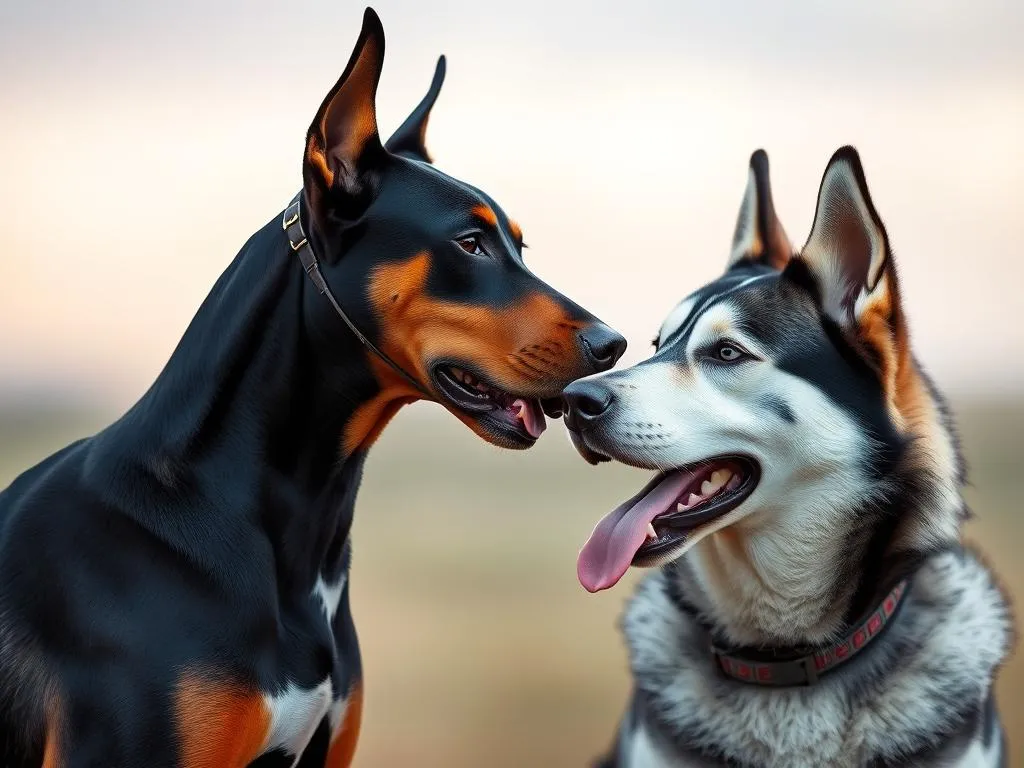
Dog breeds are a fascinating subject, showcasing the incredible diversity and variety within the canine world. Each breed is unique, with distinct characteristics shaped by history, environment, and human interaction. In this guide, we’ll dive deep into a comparison of two popular breeds: the Doberman and the Husky. Understanding their similarities and differences is essential for prospective dog owners who want to find the best fit for their lifestyle and family.
Understanding Dog Breeds
What is a Dog Breed?
A dog breed is a specific group of domestic dogs with hereditary traits that differentiate them from other breeds. Breeding plays a crucial role in developing these traits, which can include size, coat type, temperament, and behavior. Each breed has a unique history and purpose, which has influenced its physical appearance and personality.
Choosing the right breed is vital as it affects your lifestyle and living conditions. Some breeds are more suited for active families, while others may thrive in quieter environments. Compatibility with your family dynamics and home setup is essential for a harmonious relationship with your furry companion.
Overview of the Doberman
History and Origin
The Doberman breed was developed in the late 19th century by a tax collector named Karl Friedrich Louis Dobermann in Germany. He wanted a loyal and protective companion while he worked. The Doberman was bred for strength, intelligence, and an unwavering loyalty, making them one of the best guard dogs.
Physical Characteristics
Dobermans are known for their striking appearance. They are medium to large-sized dogs, typically weighing between 60 to 100 pounds and standing around 24 to 28 inches tall at the shoulder. Their sleek, muscular build, combined with a short, smooth coat, gives them an elegant yet powerful look. Common coat colors include black, red, blue, and fawn, often with rust-colored markings.
Their grooming needs are relatively low, requiring only regular brushing to keep their coat healthy and free from debris.
Temperament and Behavior
Dobermans are renowned for their intelligence and trainability. They are highly alert, making them excellent watchdogs. While they can be protective, proper training and socialization from a young age are crucial to ensure they develop into well-rounded companions.
Generally, Dobermans are affectionate with their families and can be great with children when raised together. Their loyalty is unmatched, which can sometimes lead to overprotectiveness if not properly managed.
Health Considerations
Like all breeds, Dobermans are prone to certain health issues. Common concerns include hip dysplasia, dilated cardiomyopathy, and von Willebrand’s disease. With proper care, they can live between 10 to 12 years. Regular veterinary check-ups and a balanced diet are essential for maintaining their health.
Overview of the Husky
History and Origin
The Husky, particularly the Siberian Husky, has a rich history that dates back thousands of years. Originally bred by the Chukchi people in Siberia, these dogs were used for sledding, herding, and companionship. Their endurance and ability to thrive in cold climates made them invaluable to the nomadic tribes of the Arctic.
Physical Characteristics
Siberian Huskies are medium-sized dogs, typically weighing between 35 to 60 pounds and standing about 20 to 24 inches tall. They have a thick double coat that can come in various colors, including black, gray, red, and agouti, often with striking facial markings. Their beautiful blue or multi-colored eyes are one of their most distinctive features.
Grooming needs for Huskies are higher than for Dobermans, as they shed heavily, especially during seasonal changes. Regular brushing is essential to control shedding and maintain their coat.
Temperament and Behavior
Huskies are known for their friendly and outgoing personalities. They are typically good with children and can be quite social with other dogs. However, their high energy levels mean they require plenty of exercise and mental stimulation. Huskies are independent thinkers, which can lead to stubbornness during training.
They are not usually aggressive but can have a strong prey drive, so supervision around small animals is essential.
Health Considerations
Siberian Huskies are generally healthy dogs, but they can be prone to certain conditions like hip dysplasia and eye issues, such as cataracts and progressive retinal atrophy. Their lifespan is around 12 to 15 years, and a balanced diet, regular exercise, and routine veterinary care are vital for their overall well-being.
Comparison of Doberman and Husky
Physical Traits
When comparing Doberman vs Husky, the first noticeable difference is their size and build. Dobermans are larger and more muscular, while Huskies are medium-sized with a more athletic build. Grooming needs also differ; Dobermans require minimal maintenance, while Huskies need regular brushing due to their shedding.
Temperament Analysis
Dobermans are protective and loyal, often forming strong bonds with their families. In contrast, Huskies are more social and friendly but can be independent. This difference in temperament influences how they interact in various environments, such as family settings or during training sessions.
Exercise Requirements
Both breeds are active and require regular exercise. Dobermans thrive on structured activities, such as obedience training or agility courses, while Huskies need more free play and exploration, often enjoying long runs or hikes. A lack of exercise can lead to behavioral issues in both breeds.
Training and Socialization
Training approaches for Doberman vs Husky can differ significantly. Dobermans respond well to consistent, firm training due to their intelligence and eagerness to please. Huskies, on the other hand, may require more patience due to their independent nature. Early socialization is crucial for both breeds to ensure they develop well-adjusted personalities.
Living Conditions
Regarding living conditions, Dobermans adapt well to various environments, including apartments, as long as they receive sufficient exercise. Huskies, however, thrive in homes with ample space to run and play. Both breeds benefit from a secure yard, but Huskies are known for their escape artist tendencies, so a high fence is essential.
Pros and Cons of Each Breed
Doberman
Advantages:
– Highly intelligent and trainable
– Loyal and protective nature
– Good watchdogs
Disadvantages:
– Can show aggression if not properly socialized
– Require a strong leader for training
Husky
Advantages:
– Friendly and good with families
– Energetic and playful
– Great for active individuals
Disadvantages:
– Stubbornness can make training challenging
– High exercise needs require dedicated time
Making the Right Choice for You
Assessing Your Lifestyle
Before deciding between a Doberman vs Husky, consider your lifestyle. Are you an active individual who loves outdoor adventures? A Husky may be a great fit. If you prefer a loyal companion that can also serve as a protector, a Doberman might be more suitable.
Questions to Ask Yourself
- How much time can you dedicate to exercise and training?
- Do you have children or other pets that need consideration?
- Are you prepared for the grooming needs of each breed?
Seeking Professional Advice
Consulting with breeders, trainers, or veterinarians can provide valuable insight into the specific needs of each breed. They can help you understand more about the breed characteristics and what to expect as a new owner.
Conclusion
When weighing Doberman vs Husky, it’s essential to consider the unique traits of each breed. While both are incredible companions, their differences in temperament, training needs, and exercise requirements can significantly impact your experience as a dog owner. Take the time to assess your lifestyle and choose a breed that fits your family and environment.
Choosing the right dog breed is a significant commitment that requires careful consideration. By understanding the characteristics of both Dobermans and Huskies, you can make an informed decision that leads to a happy and fulfilling relationship with your new furry friend.
FAQs
Common Questions about Dobermans and Huskies
Q: Are Dobermans good with children?
A: Yes, when properly socialized and trained, Dobermans can be affectionate and protective of children.
Q: Do Huskies bark a lot?
A: Huskies are known to be vocal but typically do not bark excessively. They may howl or “talk” instead.
Q: How much exercise do Dobermans need?
A: Dobermans require at least an hour of exercise daily, including walks, runs, and playtime.
Q: Are Huskies easy to train?
A: Huskies can be stubborn and independent, making training a bit challenging. Consistent, positive reinforcement methods work best.
Specific Concerns
If you have concerns about behavioral issues, health care, or training tips, it’s best to consult with a professional trainer or veterinarian who can provide guidance tailored to the specific needs of your dog breed.








